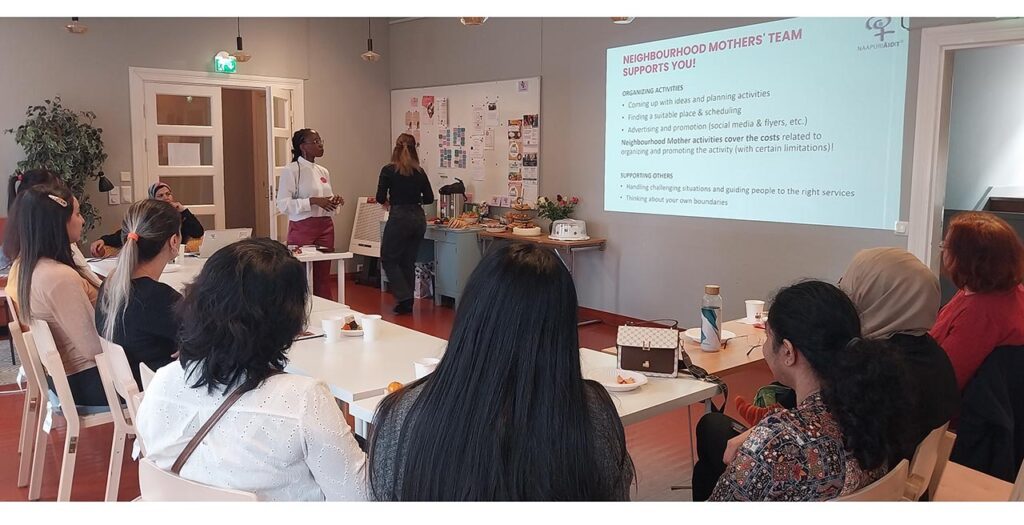Mental health is a crucial aspect of overall well-being, affecting how individuals think, feel, and interact with others. It varies greatly depending on cultural background and upbringing. Good mental health helps people manage stress, build strong relationships, and contribute positively to society. However, many face challenges that impact their emotional, social, and physical health. Despite its importance, mental health remains a taboo subject in many cultures, especially among immigrant women. (Delara 2016; Bamgbose Pederson & Williams 2022; Nyikavaranda, 2023).
This article examines why mental health remains a sensitive issue among immigrant communities, particularly women, and suggests culturally responsive strategies to reduce stigma and improve access to care. Co-authored by Femke van Schelle, a second-year Paramedic Nursing student at LAB University of Applied Sciences, it draws on insights from a mental health and substance abuse internship at the Neighbourhood Mothers’ program (Naapuriäidit-toiminta) in Lappeenranta, South Karelia. Run by the Nicehearts organization, this peer support volunteer program helps immigrant women integrate into the Finnish society through group activities and support.

Why mental health can be a taboo topic among immigrant families
In many cultures, mental health issues are seen as weaknesses. Women face additional pressures due to traditional gender roles, where expressing emotional distress can negatively impact their caregiving roles.(Silva & Silva 2023; Ponte 2019.)
Many immigrants fear that revealing mental health struggles could lead to further exclusion or being perceived as unfit for employment or parenting (Ijioma 2023). These concerns often lead individuals to suffer mental health problems in silence (Pumariega, Rothe & Pumariega 2005).
Barriers to mental healthcare for immigrant women
Lack of awareness and language barriers contribute to mental health being seen as a taboo topic. Many immigrants come from countries with scarce mental health services and may rely on community or religious support, which might not be available in their new country (Chiodo 2024).
Adapting to a new system can be challenging, with language barriers making it difficult to understand resources, communicate symptoms, and discuss issues with providers (Nyikavaranda 2023). Structural barriers and distrust in the healthcare system, including discrimination or cultural insensitivity, further deter people from seeking care (Kirmayer 2011; Iliadou & Papadakaki 2019).
Strategies to overcome barriers and support immigrant women’s mental health
Developing culturally sensitive and linguistically appropriate mental health services is crucial. Offering choices in service delivery can better accommodate immigrant women’s needs. Community-based peer-support groups provide safe spaces for sharing experiences and coping strategies, reducing isolation and promoting belonging. (Silva & Silva 2023.) Education and psychoeducation programs empower immigrant women by increasing their understanding of mental health and available resources. (Bamgbose Pederson & Williams 2022).
The internship highlighted cultural barriers and stigma surrounding mental health among immigrant women and families and explored solutions to overcome these challenges. Mental health discussion cards and Safe Space Guideline Cards were developed to promote a respectful, inclusive environment. Breaking the stigma requires a multi-layered approach, including culturally competent healthcare services, community education, and policy changes. Addressing these barriers can empower individuals to seek help without fear or shame. Unaddressed mental health struggles can hinder integration and cause long-lasting consequences. Immigrant women face unique stressors that can lead to serious mental health concerns such as depression, anxiety, and PTSD. (Pumariega, Rothe & Pumariega 2005; Kirmayer 2011.)
Authors
Femke van Schelle ia a 2nd year Paramedic Nursing student at LAB University of Applied Sciences.
Valentine Mukundwa-Ishimwe is a Regional Coordinator of Neighbourhood Mothers Program in South Karelia.
Irina Tiainen is a Senior lecturer at LAB University of Applied Sciences.
References
Bamgbose Pederson, A. & Williams, E. 2022. Perspectives of Black immigrant women on mental health: The role of stigma. Women’s Health Reports. Vol. 3(1), 307–317. Available at https://www.liebertpub.com/doi/10.1089/whr.2021.0071
Chiodo, G. 2024. Immigrant families need nuanced, creative approaches to mental health. The Center for Law and Social Policy. Cited 24 Apr 2025. Available at https://www.clasp.org/blog/immigrant-families-need-nuanced-creative-approaches-to-mental-health/
Delara, M., 2016. Social determinants of immigrant women’s mental health. Advances in Public Health. 1–11. Available at https://doi.org/10.1155/2016/9730162
Ijioma, C., 2023. Breaking cultural stigma associated with mental health among Black immigrants. St. Louis: University of Missouri.
Kirmayer, L.J. 2011. Common mental health problems in immigrants and refugees: General approach in primary care. Canadian Medical Association Journal. Vol. 183(12), 959–967. https://doi.org/10.1503/cmaj.090292
Iliadou, M and Papadakaki, M. 2019. Addressing mental health issues among migrant and refugee pregnant women: A call for action. European Journal of Midwifery. Vol. 3(7). Available at https://www.europeanjournalofmidwifery.eu/pdf-108626-39629?filename=Addressing%20mental%20health.pdf
Nyikavaranda, P.P. 2023. Barriers and facilitators to seeking and accessing mental health support in primary care and the community among female migrants in Europe: A “feminisms” systematic review. International Journal for Equity in Health 22, 196. https://doi.org/10.1186/s12939-023-02074-7
Ponte, K. 2019. Mental health challenges in immigrant communities. National Alliance on Mental Illness (NAMI). Cited 24 Apr 2025. Available at https://www.nami.org/bipolar-and-related-disorders/mental-health-challenges-in-immigrant-communities/
Pumariega, A.J., Rothe, E. & Pumariega, J.B. 2005. Mental health of immigrants and refugees. Community Mental Health Journal. Vol. 41(5), 581–597. Available at https://doi.org/10.1007/s10597-005-6363-1
Silva, P. and Silva, D., 2023. Promoting psychosocial well-being and empowerment of immigrant women: A systematic review of interventions. Behavioral Sciences. Vol. 13(6), 579. https://doi.org/10.3390/bs13060579
Naapuriäidit, 2025. Naapuriäidit – Neighbourhood Mothers programme. Nicehearts ry. Cited 24 Apr 2025. Available at https://naapuriaidit.fi/en/
Nicehearts, 2025. Naapuriäidit – Neighbourhood Mothers programme. Nicehearts ry. Cited 24 Apr 2025. Available at https://www.nicehearts.com/




